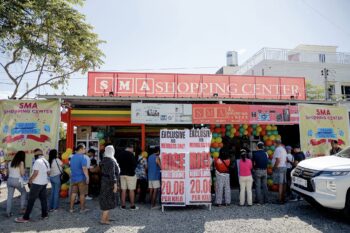DAVAO CITY (MindaNews/11 October) – Beauty queens turned social entrepreneurs from the Bagobo-Klata tribe in Baguio District here have ventured into a business that will promote their culture and traditional coffee in the local market.
Reigning “Hiyas ng Kadayawan” Inna B. Garcia and her business partner Kessia D. Tar, who held the crown in 2014, started the coffee venture “Kape Netibo,” a traditional coffee made from a mixture of Excelsa variety and corn, barely a month ago with hopes to uplift the livelihood of the other Lumads.
A graduate of BS Accounting Technology at the Ateneo de Davao University, Tar said they chose to invest in the city’s coffee future because it is “something sustainable and a basic need for some people.”
She said that by selling coffee they hope to lessen the dependence of the Lumad on government and enable them to stand on their own feet one day.
The two, who are also community leaders, got the permission from the Bagobo Tribal Council to market their traditional coffee.
“They are supportive, excited, and thankful for this new venture,” she said.
Tar added that coffee and corn abound in the hinterland communities of Tamayong, Calinan, Baguio District, and Tambobong where most of the Lumad from the city live off the land as farmers.
She said they buy coffee from the Lumad at P130 a kilo, almost twice the price of P80 a kilo offered by merchants in downtown Davao.
Aside from the premium price, she said they give Lumad a 30-percent share for every coffee sold, which comes in packs of 150 grams for P85.
She said selling “Kape Netibo” is a way of promoting their identity as Lumad, as she pointed out that there are no popular native products in the city that they could claim as their own despite the city’s tourism pitch on the diverse cultures of indigenous peoples.
Garcia, a graduate of marketing from the Philippine Women’s College added that they are planning to introduce “Kape Netibo” as a pasalubong item in the city.
Tar said they hope to further improve the quality of their coffee and production capacity, as they envision to see “Kape Netibo” being offered in coffee shops.
Thelonious S. Trimmel, chief of party of the Agricultural Cooperative Development International-Volunteers in Overseas Cooperative Assistance (ACDI-VOCA), told a press conference on October 3 that the quality of coffee from Mindanao can compete with the specialty products of other coffee-growing nations like Brazil, Colombia, and even Ethiopia, in Africa, known as “the birthplace of coffee.”
He said they need to educate farmers on post-harvest handling and processing so they can improve on quality with coffee exports of other countries.
“We need to work on improving productivity and quality of coffee. They can compete in specialty Arabica and fine Robusta market,” he said.
ACDI-VOCA provides assistance such as technology and training on best practices to farmers, he said.
He said ACDI-VOCA implements the four-year USDA-financed Mindanao Productivity in Agricultural Commerce and Trade project, which is designed “to increase the income of the 10,600 smallholder cacao, coconut, and coffee farm families in Southern and Western Mindanao.”
Department of Trade and Industry-Compostela Valley director Siegred Balleque said that 65 percent of the 25,000 metric tons of the total production in the market is produced in Mindanao.
“We should make sure that we have the best coffee and one of the best in the world,” he said.
The Philippine Coffee Board Inc. will hold the 9th Coffee Summit on October 12-13 at the SMX Convention Center here.
Ted Lingle, founder of the Coffee Quality Institute and the promoter of Quality coffee will be among the international speakers.
Last June, Lingle visited the country to hear out the farmers and processors and made some review on the quality of the Philippine coffee.
“You have some best kept secrets here,” the press briefer quoted Lingle.
He encouraged farmers in the city “to learn the language of quality, which is the language of coffee. In the international coffee trade language, coffee is graded using a 100-point scale, with 80 being called Specialty grade.” (Antonio L. Colina IV/MindaNews)
